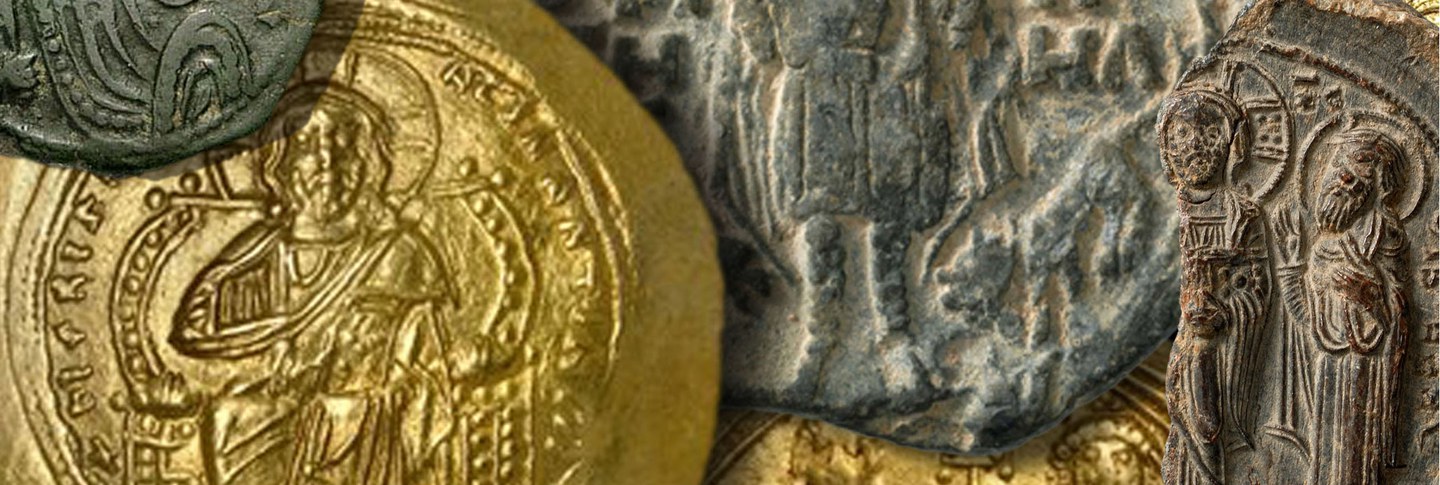
Coins and Seals Summer Program
June 5–16, 2023 | Princeton University Library, Dumbarton Oaks, and Library of Congress
Coins and seals offer priceless insight into many aspects of the Byzantine world including historical geography, prosopography, paleography, art history, theology, and economic, institutional, and administrative history. Dumbarton Oaks’ collections of twelve thousand coins and seventeen thousand lead seals form the finest, largest, and most comprehensive specialized assemblages in the world.
For nearly two decades, the Byzantine Coins and Seals Summer Program has provided students with access to these unparalleled collections. Dumbarton Oaks will offer the program again this summer, from June 26 to July 21, 2023, under the direction of Dr. Alan Stahl (Princeton University) and Dr. Jonathan Shea (Dumbarton Oaks).
Program Description
Seminars will introduce the basics of the disciplines of numismatics and sigillography, including bibliography and the use of coins and seals as evidence for Byzantine political, economic, and art history. Students will be instructed how to read and date Byzantine coins and seals and how to incorporate that material into their research. Students will gain experience handling coins and seals both in daily seminars and will prepare an original piece of research which they will present to the group at the end of the summer school.
Admission Requirements
Applications from doctoral students in any area of Byzantine studies, junior faculty members teaching at least one course in Byzantine studies at a college or university, or junior curators with responsibility for Byzantine objects will be given highest priority. Other complete applications may be considered on a case-by-case basis if space is available.
Acceptance is contingent on verification of the applicant’s status as doctoral student, junior faculty, or junior curator. Two years of college-level Classical Greek (or its equivalent) is required for participation in the program and reading knowledge of French and German is highly desirable.
Accommodation and Expenses
Successful applicants receive a grant package, which includes accommodation (except for participants living in the greater Washington area), lunch on weekdays in the Refectory, and a library reader’s pass for the duration of the course. There is no fee for participation in the program, but participants are responsible for their own transportation costs.
Applications
Applications, to be written in English, must be submitted electronically by February 13, 2023.
To apply, applicants must submit the following:
- Cover letter, describing their academic background, why numismatics and sigillography are important for their intellectual and professional goals, and any potential topics that they propose to pursue as their research projects
- Curriculum Vitae
- Transcript of graduate school record (a copy of unofficial transcripts is acceptable)
Additionally, applicants should submit two letters of recommendation. Candidates are strongly encouraged to request one letter from a faculty member who has instructed them in an area of Byzantine studies and/or is familiar with their progress in Greek.
Selection criteria will include (but are not limited to) the program’s relevance to applicants’ present and future research projects.
For further information, please write to the Byzantine Studies program coordinator, at byzantine@doaks.org.
Past Years
2021
June 28–July 23, 2021 | Alan Stahl and Jonathan Shea
Participants
- Nikolas Churik, Princeton University
- Sofia Efthymoglou, Aristotle University of Thessaloniki
- Elisa Galardi, University of Pennsylvania
- Nikolas Hächler, Institute for Byzantine Studies, LMU Munich/University of Zurich
- Irini Karra, Acropolis Museum
- Alex Magnolia, University of Minnesota
- Tine Rassalle, University of North Carolina at Chapel Hill
- Virginia Sommella, Bilkent University
2019
July 1–26, 2019 | Alan Stahl and Jonathan Shea
Participants
- Aurora Camaño, Simon Fraser University
- Antonio Di Cosmo, Pontificio Istituto Orientale, Rome
- Nastasya Kosygina, University of California, Irvine
- Aristotelis Nayfa, University of Edinburgh
- Aikaterini Peppa, Université Paris 1 Panthéon-Sorbonne and University of Athens
- Mustafa Yildiz, University of California, Berkeley
- Daniel Zimmerman, University of California, Santa Barbara
2015
July 6–31, 2015 | Eric McGeer and Vasiliki Penna
Participants
- Sergio Basso (University of California, Berkeley)
- Stefanos Dimitriadis (Koc University)
- Polina Ivanova (Harvard University)
- Rózsa Márton (Eötvös Loránd University)
- Nikolaos Mastrochristos (National and Kapodistrian University of Athens)
- Brian Salas (University of Chicago)
- Panagiotis Theodoropoulos (King’s College)
- Rossana Valente (University of Edinburgh)
2009
August 7–31, 2009 | Cécile Morrisson and John Nesbitt
Participants
- Yaman Dalanay
- Rebecca Day
- Andreas Gkoutzioukostas
- Jonathan Shea
- Irina Tamarkina
- Ece Turnator
- Luca Zavagno.